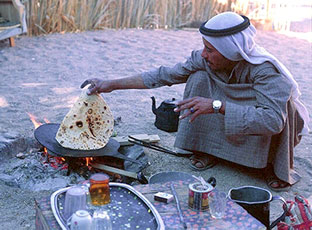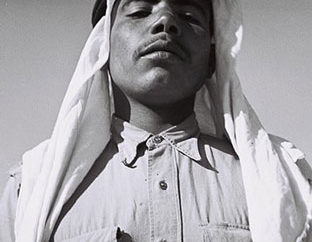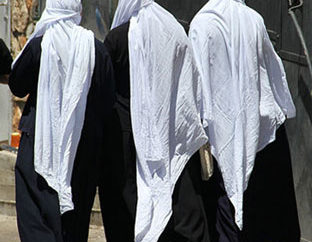Bedouins
Bedouins in Israel
Traversing the desert route from Jerusalem to the Dead Sea, one invariably catches sight of Bedouin youth herding sheep or goats and Bedouin women bearing a basket on their heads … not to mention the sign advertising camel rides, under the supervision of camel-smart Bedouins. Bedouins of Israel are a fascinating study of a minority culture whose nomadic way of life is severely challenged in modern times.

Baking Outdoors (Photo: צולם על ידי סגוד, CC BY 2.5)
Bedouin People
Visiting a Bedouin family in their “Khan” (traditional Bedouin encampment) makes for a memorable experience. A large tent faces east and on the floor are straw mats and brightly colored pillows. Family members drink their “finjan” of specially brewed coffee while the visitor drinks in their colorful lifestyle. In the evening, just before the moon rises, an old Bedouin tells stories about the Bedouin heritage, lifestyle, faith, culture and traditions. His stories are accompanied by Bedouin songs and music played on a flute or wooden mortar and pestle. While the music continues into the night, you can end your unforgettable evening with a moonlight walk in the desert.
Bedouin Culture
The word “Bedouin” comes from the Arabic word for “desert.” The stark contrasts with the western lifestyle are sure to make an impression. The Bedouins have an ancient culture with a code of laws. As an example, they attribute importance to natural events and ancestral traditions. Some of the traditional Bedouin are polygamists with a number of children by different wives.

Camels in the Negev (Photo: Wilson44691, CC BY-SA 3.0)
Negev Bedouin
The Negev Bedouins have been compared to the American Indians in various ways. Loyalty to their “tribe” distinguishes the Bedouin from their more nationalistic Arab cousins. As Muslims, just how do the Bedouin differ from mainstream Arabs in the Middle East? Wouldn’t it be natural to expect that with time, the Israeli Bedouin would migrate to the many mainstream Arab villages in Israel? The incompatibility between the Bedouin, who bought small plots of land for agriculture, and the Arab villagers seems to be linked to the cultural-historical difference between farmers and desert dwellers. In reality, those Bedouin who migrated from the Negev to Arab villages were not able to create positive relations with the villagers, despite a common religion and language; they are, instead, considered foreign implants.
Today, many Bedouin call themselves “Negev Arabs” rather than “Bedouin,” explaining that “Bedouin” identity is tied in intimately with a pastoral nomadic way of life – a way of life they say is over. Nevertheless, Negev Bedouin continue to possess goats and sheep. In year 2000, the Israeli Ministry of Agriculture estimated that the Negev Bedouin owned 200,000 head of sheep and 5,000 goats.

Bedouin Resting (Photo: Chmouel, CC BY-SA 3.0)
Bedouin Culture
If by now you have acquired a hankering to experience the Bedouin culture for yourself, we suggest a visit to the Museum of Bedouin Culture in the Northern Negev. Some Bedouin also maintain bed-and-breakfast accommodations in cabins, which you can use as a base for several days of sightseeing in this beautiful and heritage-rich region. In the museum, you can view the story of a day in the life of a typical Bedouin family from the middle of last century. Look and see the daily chores father, mother and children divide between themselves; working the land; schooling; solving health problems; and a wedding in the family. The professional guides at the museum (including young Bedouin women) are mostly Bedouins from the area. Their own personal stories are woven vividly into the tour.

Bedouin Woman Embroidering (Photo: זהרא אבו סיאם, Public Domain)
Bedouin Women
Two projects, “Desert Embroidery” and “Desert Weaving” are based in the Bedouin settlement of Lakiya near Beersheva (Beersheba). The projects were erected as part of a business initiative developed especially for Bedouin women. At the moment over 250 women are employed by these projects. The Ministry of Tourism has recently acknowledged these unique projects made by the Bedouin women in the settlement as tourist sites.
Bedouins: Did You Know?
Beersheva, Rahat and Kuseyfe hold a Bedouin market. Bargain with the vendors and buy your family and friends unique gifts that will let them, too, enjoy your Israel Bedouin experience.








